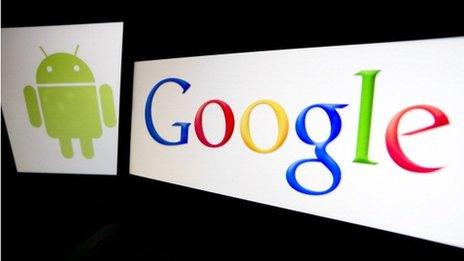Microsoft unveils $199 wearable fitness device
- Published
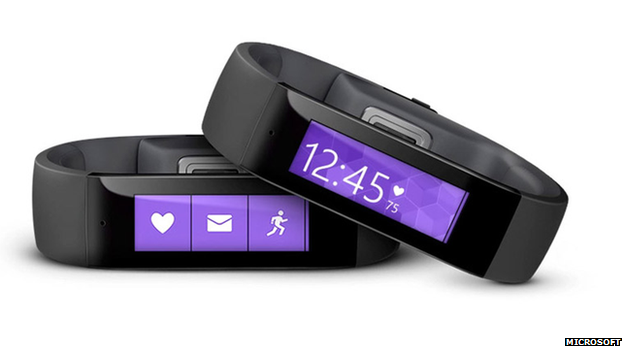
Microsoft's new fitness band can last for two days on a single charge
Microsoft has unveiled its first wearable device that can track a user's sleep and exercise as well as connect to a health service on smartphones.
The Microsoft Band will retail for $199 (£125) on the company's online store.
The device can operate for two days on a single charge and has 10 sensors that can track heart rate, calories, stress and even a person's sun exposure.
It marks Microsoft's latest push into digital health after its medical record initiative HealthVault in 2007.
"This is just the beginning of a multi-year vision for Microsoft in the health & fitness and wearables category," the company said in an emailed statement.
"We want to enter this space in a deliberate and measured fashion and as such are launching first in the United States."
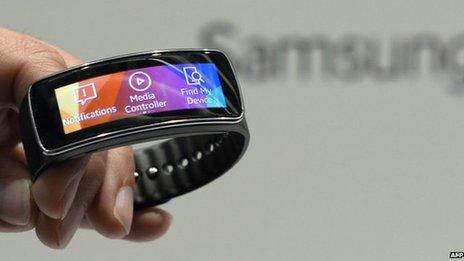
The Microsoft Band has been compared to Samsung's Galaxy Gear Fit
Technology giants Apple, Samsung and Google have all released health initiatives and are looking to further develop the growing demand for wearable devices.
However, Microsoft's device is distinctive because it will work with all major mobile operating systems as well as connect to social networks such as Facebook and Twitter.
"Consumers now have an overwhelming choice of health-related cloud platforms to choose from," Ben Wood from CCS Insight told the BBC.
"They can be forgiven for being confused by the multitude of options. It's going to be a tough decision to choose whether to place their loyalty with Apple, Google or Microsoft given the immaturity of all three platforms.
Furthermore, once they choose a platform they risk locking themselves into a long term commitment if they want to keep a lifetime of health-related data in one place."

Analysis: Richard Taylor, BBC North American technology correspondent
Microsoft had long been rumoured to be working on a health-centric wearable - and its timing, ahead of the busy holiday season, is no surprise either.
More than anything, Microsoft cannot be seen to be left behind, especially when other tech giants like Google and Apple are entering the burgeoning health-tech arena.
The Band will compete in an increasingly crowded marketplace.
Smaller startups like FitBit and Jawbone initially kick-started the sector, and today other consumer electronics hardware giants (notably Samsung) already have some traction and offer an array of devices.
However, Microsoft appears to be offering something a little different.
Unlike many of the more recent smartwatches which have recently come to market, the Band's dazzling array of sensors suggests a primary focus on fitness-tracking rather than attempting to be a multi-purpose smartphone accessory.
And whereas others work largely with one mobile operating system, the Band and its companion Health app are cross-platform.
Microsoft's cloud-based health service is also a key differentiator; harnessing Redmond's strength in cloud computing, it will offer users deep insights of data gathered from other fitness devices and rival smartphones too.
Critics will say this openness was somewhat inevitable, as its own Windows Phone has negligible market share.
But it could well prove a canny move, broadening its appeal not just to consumers but also to other hardware partners, who will be able to licence Microsoft's core sensor technology to make new gadgets of their own.

Leaked details
Details about the Microsoft Band were leaked on Wednesday after companion applications for Windows, Android and Mac phones appeared on its website ahead of an official announcement.
A Microsoft Band Sync app appeared in the Mac App Store and revealed what the product looks like.
Some analysts believe Microsoft will face stiff competition in the wearables market because "the company has little or no brand".
"Microsoft is targeting the higher tiers of the fitness band market - it's going to have to make a big marketing investment to raise awareness with US consumers," Mr Wood said.
"The number of fitness bands that have been launched this year is overwhelming - personally I'm already testing two on each wrist and I'm rapidly running out of places to wear them. It must be a daunting prospect for consumers trying to decide which one to buy."
- Published29 October 2014
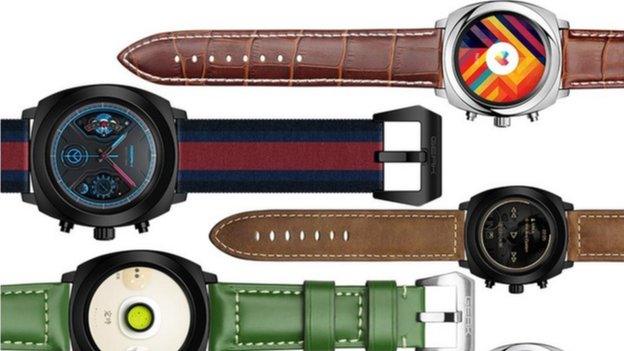
- Published26 March 2014
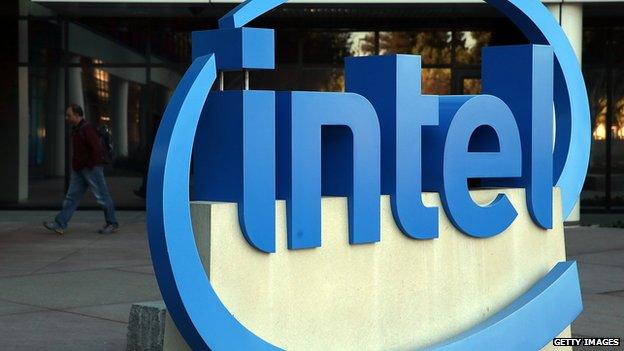
- Published10 March 2014
